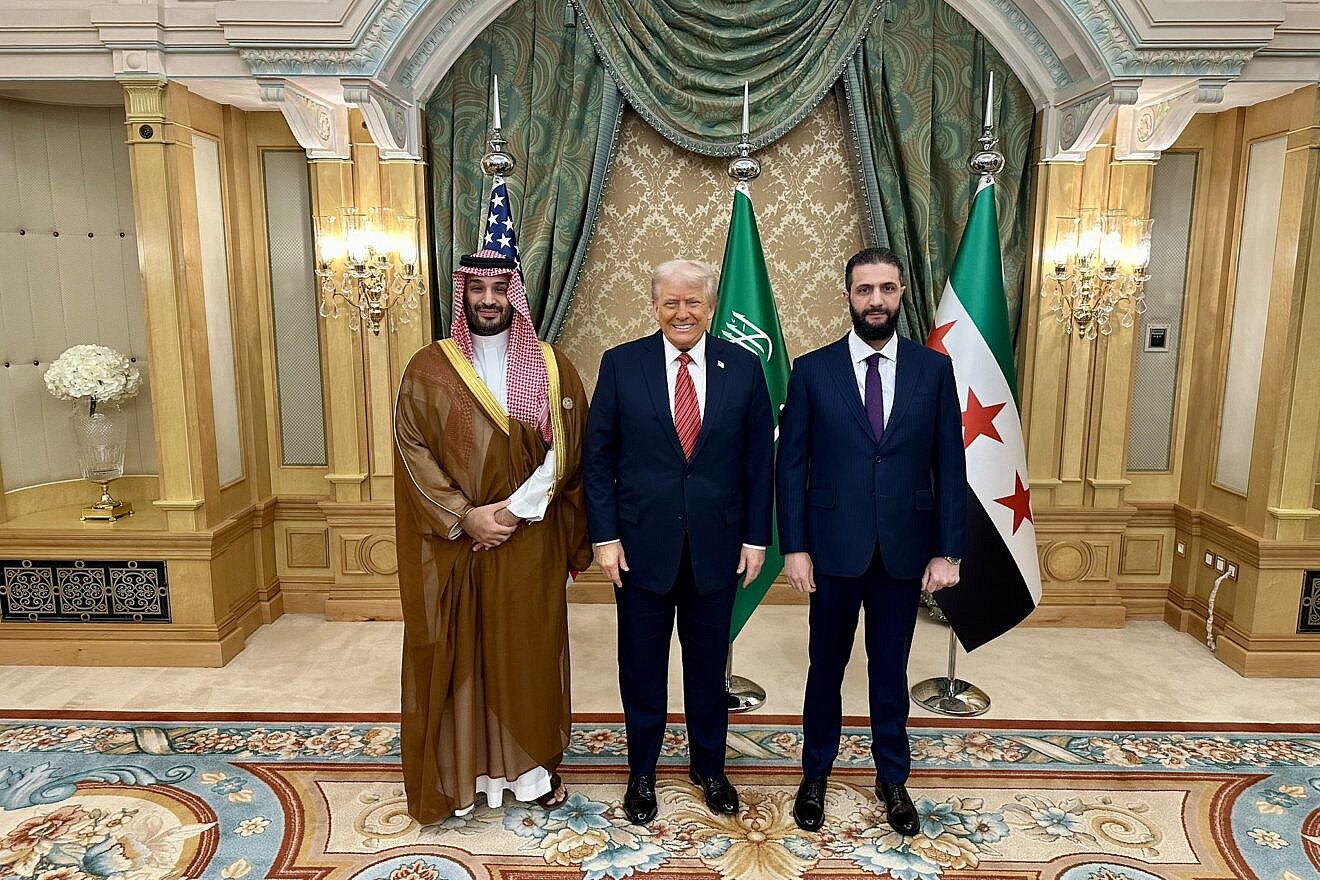by JNS Staff, Amelie Botbol
Jerusalem "must make sure that there's no invasion potential all around its borders—that includes Syria," said Benny Gantz.
 |
| U.S. President Donald Trump meets with Saudi Crown Prince Mohammed bin Salman (left) and Syrian President Ahmed al-Sharaa in Riyadh, Saudi Arabia, May 14, 2025. Credit: White House. |
An interim security deal with Syria is in reach but there is still a long way to go to normalization, Benny Gantz, a past member of Israel’s War Cabinet and a former Israel Defense Forces chief of staff, told JNS on Monday.
“I think that we can achieve some kind of temporary agreements with Syria based on security issues,” Gantz, who leads the opposition Blue and White Party, told JNS during a faction meeting at the Knesset.
After a security deal, “We can drill down the road and hopefully come to a better situation with them, including normalization,” said Gantz, speaking in English. “But that’s, I think, still [far] away from us.”
Jerusalem “must make sure that there’s no invasion potential all around its borders—that includes Syria,” the former military chief emphasized.
Yisrael Beiteinu leader Avigdor Lieberman, who served as the Jewish state’s defense minister between 2016 and 2018, told JNS that any deal with Damascus should include recognition of Israel’s sovereignty over the Golan Heights, which Jerusalem liberated from Syria in 1967.
“If it is possible to reach normalization with Syria in exchange for them recognizing Israeli sovereignty over the Golan Heights, I can certainly only welcome that,” he said at a faction meeting.
On Monday, several Syrian tanks were identified advancing toward As Suwayda in southern Syria, Israel’s military reported.
The IDF struck the tanks in order to prevent their arrival to the area as their presence “in southern Syria may pose a threat to the State of Israel,” the military said in a statement.
“The IDF will not allow the establishment of a military threat in southern Syria and will operate against it. The IDF continues to monitor the developments in the area,” it said.
Syria’s new regime on July 4 claimed a willingness to work with the United States to reimplement the 1974 disengagement agreement with Israel, which created a U.N.-monitored buffer zone separating the two countries.
After a phone call with U.S. Secretary of State Marco Rubio, Syrian Foreign Minister Asaad al-Shaibani confirmed Damascus’s “aspiration” to cooperate with Washington to return to the 1974 deal.
Thomas J. Barrack Jr., U.S. ambassador to Turkey and special envoy for Syria, told The New York Times on July 3 that Jerusalem and Damascus were engaged in “meaningful” talks to restore calm to the shared border.
However, Barrack said that negotiations could take time because new Syrian leader Ahmed al-Shara, also known as Abu Mohammed al-Jolani—a former Al-Qaeda terrorist—could face resistance at home.
“He cannot be seen by his own people as being forced or coerced into the Abraham Accords,” explained Barrack, referring to the agreements that normalized the Jewish state’s diplomatic relations with four Arab countries: the United Arab Emirates, Bahrain, Sudan and Morocco.
Earlier this month, Israeli Foreign Minister Gideon Sa’ar said that Jerusalem is committed to expanding the Abraham Accords and is “interested in adding countries such as Syria and Lebanon, our neighbors, to the circle of peace and normalization.”
However, Lebanese President Joseph Aoun over the weekend ruled out the possibility of normalizing Beirut’s relations with Israel, though he expressed a desire to end the longstanding conflict with Jerusalem.
“Peace is the lack of a state of war, and this is what matters to us in Lebanon at the moment. As for the issue of normalization, it is not currently part of Lebanese foreign policy,” Aoun said, according to Agence France-Presse.
Israeli opposition leader Yair Lapid (Yesh Atid Party) told JNS on Monday that as long as Iranian-backed Hezbollah terrorists rule Lebanon, there will be no normalization.
“I think the future of Lebanon depends on their ability to restrain Hezbollah and to make sure that they are the only body that has the power over the state,” said Lapid after his faction meeting, referring to the Lebanese government.
“Then, we will be more than willing to have normalization with the Lebanese people,” he added. However, “as long as Hezbollah is ruling the country militarily, the problem we have with Lebanon remains.”
Israeli officials have repeatedly vowed to prevent another attack similar to the Hamas-led Oct. 7, 2023, massacre from the Gaza Strip, in which Arab terrorists murdered some 1,200 people and took 251 captive.
Following a visit to IDF troops serving on the border with Syria on Jan. 2, Sa’ar tweeted that “Israel is closely monitoring the situation in Syria and will not jeopardize its own security.” The top diplomat added: “We will not allow another Oct. 7 on any front.”
JNS Staff, Amelie Botbol
Source: https://www.jns.org/gantz-interim-deal-with-syria-can-be-achieved-normalization-still-far-away/
No comments:
Post a Comment